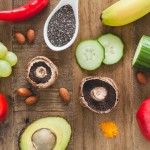Multivitamins, pregnancy and autism claims: Amaze responds
Posted on
Professor Andrew Whitehouse has written extensively on autism and how families respond to diagnosis.
From the moment a child is diagnosed, he says, the family enters the unknown.
Professor Whitehouse, who directs the Autism Research Team at the Telethon Kids Institute and is Chief Research Officer for Autism Cooperative Research Centre, describes a world where conference halls are lined with salespeople. Letterboxes are stuffed with pamphlets, and life is transformed into a whirlwind tour of a fantastical array of therapies and potions that are positioned as the “cure all” for their child’s difficulties.
It’s no surprise that when a story emerges about a therapy or diet that promises huge benefits to autistic people, controversy follows.
It happened early this year when media reported on the release of The Magic Pill, the paleo documentary from celebrity chef Pete Evans.
Diet modification is common
Professor Whitehouse says diet modification is one of the most prominent alternative therapies.
He last year wrote about this for The Conversation, stating, “A diet free of gluten (found in wheat, rye and barley) and casein (the main protein in dairy products) attracts more attention than any other and is estimated to be given to approximately 40% of individuals with autism spectrum disorder (ASD).
“In some cases, clinicians recommend diets; in others, they’re instigated by parents eager to find anything that may help their child.
“But there is currently little scientific evidence the gluten-free, casein-free (GFCF) diet has beneficial effects for children with autism.”
Professor Whitehouse told Fairfax, “There’s no question that the number of children with ASD who have gut problems is higher than what would normally be expected in children generally but how this might relate to diet is still very murky.
Lack of rigorous research studies
“I see parents who swear black and blue that changing their diet has helped their children and my answer is ‘I believe you but at the moment there’s little scientific evidence to say that changing the diet improves autistic behaviours – so go into it with your eyes open’. We need more evidence to guide clinical decision-making.”
The most recent research to attract headlines suggested mothers who take multivitamins during early pregnancy may reduce the risk of their children developing autism.
Following about 270,000 UK mothers and their babies across 10 years, the British Medical Journal study found that children were about half as likely to develop autism compared to those whose mothers took none.
Meanwhile, when researchers examined intake of iron and folic acid alone there was no consistent evidence that their use was associated with a reduced risk of autism.
Accredited dietitian and nutritionist Melanie McGrice told The New Daily she already advises women who are either pregnant or trying to conceive to take multivitamins.
“I certainly recommend women take multivitamins during pregnancy and prior to conception,’ she said.
“Not in lieu of a healthy diet, but in conjunction with a nutritional diet as it’s very difficult for women to meet all nutritional requirements during pregnancy.”
But Professor Anthony Hannan, a Florey Institute neuroscientist with a research interest in autism, said one study alone would not suggest women should be taking multivitamins.
“The current evidence-based guidelines from the NHMRC (National Health and Medical Research Council) are focused on maintaining a healthy, balanced diet in terms of the food you eat,” he said.
“Child health outcomes can be the result of many factors including stress levels, sleep patterns and exercise.”
Amaze chief executive officer Fiona Sharkie says: “We don’t know what causes autism, it is a complex neurological condition and is highly likely that we never will know.
“It’s important that we recognise this research hasn’t determined a causal link and we’d be concerned about it giving rise to pregnant women believing they should take vitamin supplements to prevent their child developing autism.”
Following about 270,000 UK mothers and their babies across 10 years, the British Medical Journal study found that children were about half as likely to develop autism compared to those whose mothers took none.
Meanwhile, when researchers examined intake of iron and folic acid alone there was no consistent evidence that their use was associated with a reduced risk of autism.
Accredited dietitian and nutritionist Melanie McGrice told The New Daily she already advises women who are either pregnant or trying to conceive to take multivitamins.
“I certainly recommend women take multivitamins during pregnancy and prior to conception,’ she said.
“Not in lieu of a healthy diet, but in conjunction with a nutritional diet as it’s very difficult for women to meet all nutritional requirements during pregnancy.”
But Professor Anthony Hannan, a Florey Institute neuroscientist with a research interest in autism, said one study alone would not suggest women should be taking multivitamins.
“The current evidence-based guidelines from the NHMRC (National Health and Medical Research Council) are focused on maintaining a healthy, balanced diet in terms of the food you eat,” he said.
“Child health outcomes can be the result of many factors including stress levels, sleep patterns and exercise.”
Amaze chief executive officer Fiona Sharkie says: “We don’t know what causes autism, it is a complex neurological condition and is highly likely that we never will know.
“It’s important that we recognise this research hasn’t determined a causal link and we’d be concerned about it giving rise to pregnant women believing they should take vitamin supplements to prevent their child developing autism.”


